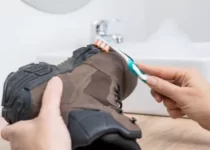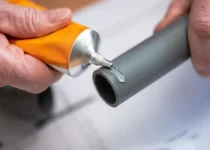Does Glue Expire-Get honest answer here
Like most natural products, adhesives also have an expiration date. After their expiration dates, you may notice that your liquid water-based and natural glues are no longer usable. if you are looking for general expiry date for most of the glues then its between 6 to 24 months from the date of manufacturing depending on type of glue, its application and storage conditions.
If the glue has passed its expiration date, it will no longer have the proper bonding properties, and you’ll need to dispose of it. The proper disposal of glue is essential.
Several factors influence the shelf-life of glue.
- The type of glue
- Ingredients used in the formulation of glue
- Conditions of storage for glue
- How often does the glue get used? (Is it exposed to moisture, air, water vapor, or humidity?)
Does Glue Expire?
The glue product is versatile and comes in many forms. These products include epoxy resin, wood glue, and plastic cement. Other types of glue include nail polish, paint, wallpaper paste, and other products.
The expiration date of the glue is usually printed on the container. Always check the label to ensure that you are not using expired glue. Ask your local store for assistance.
You may need to purchase an old bottle of adhesive at times. You will likely need several bottles if you plan to do a large project. Before you buy, make sure to check the expiration date.
You can still use the glue if it has passed its expiration date. The process will take longer than normal.
After a certain time, you may notice that some types of glue lose their effectiveness. You should use them as soon as possible after your first purchase.

When Does Glue Expire?
Most glue expires due to improper storage. If you don’t leave it in the sun, it will last two to three years. It can last for a longer time. The longer you wait, the less effective the product can be.
Water-based glues have a shelf-life of two to three years. Spray adhesives, liquid glues, markers, and paper-backed adhesives are examples. If you store them properly, they won’t rot or degrade.
You can expect your glue to last longer if you don’t open the batch. Open glues will be exposed to oxygen. Once you open up the packaging or bottle, the timer will begin to tick.
When do different types of glue expire?
Many glues are classified based on their application, formulation, or how they work.
These are the general categories:
Natural
- The adhesives that we use are all-natural.
- These glues are also known as bio adhesives because they only use organic ingredients in their formulation.
One-part
- To activate the one-part glues, a chemical reaction is required.
- When exposed to heat, moisture, or water vapor, these adhesives begin to dry and cure.
Multi-part
- Epoxy glue is the most common multi-part glue. The resin and hardener components are separate and need to be combined.
- Through a chemical reaction, the parts of the mixture create a cross-linked polymer.
Anaerobic
- This type of adhesive works without oxygen
- They are used to adhere metals and other materials to metals
Synthetic
- These adhesives are made from synthetic materials, such as thermoplastics and emulsions.
Contact
- Contact glue is the best choice for attachments that are tough and need to resist tear
Pressure-sensitive
- This type of adhesive requires pressure to form a strong bond
- You can apply the pressure with the help of clamps, hooks, or ropes.
Drying
- The adhesives will harden when dried. to make your glue dry faster post application follow these methods.
Hot
- Hot glue guns are materials that melt when heated and then harden upon cooling.
How can you tell if the glue is bad?
It’s essential to check if glue sticks are bad before using them. If you want to know your glue is bad, look at the color, smell, and texture. The glue has gone bad if it is yellowing or smells unpleasant. It may also be lumpy and grainy. Test your glue stick on a piece of paper to see if it’s bad. Replace the glue if it doesn’t adhere or leaves an uneven coating.
How long glue sticks will last depends on the frequency of use and how they are stored. Unopened glue sticks should last up to two years, and opened ones should last between 6-12 months. Store your glue sticks in a dry, cool place away from sunlight to extend their shelf life. It’s essential to understand how to determine if a glue stick is bad and how long it will last.
Check for any changes in the color, texture, or odor. Test it on paper as well to ensure it is still working. Store them in a dry, cool place away from direct sun to ensure longevity.
How long does Super Glue last?
The shelf life for most types of superglue is 18-24 months. The shelf life of super glue is only about six months once the bottle has been opened.
If you have an open bottle of superglue, use it as soon as possible.
Check the expiration date of the glue bottle if you are not sure. You can also check the manufacture date if there isn’t an expiration date.
The date of manufacture is usually printed on the bottom.
You can also smell your glue to see if it’s expired. If the glue smells like vinegar, discarding it is probably time.
Vinegar is produced as superglue breaks down.
If it’s still good, your superglue should be transparent and sticky. If your super glue is starting to turn yellow or brown, it’s best to throw it out.

How long does Elmer’s Glue last before expiring?
Elmer’s adhesive can last between 8 and 12 months. The shelf life of glues depends on several factors. These may include the time the glue has been exposed to the air or used and the conditions in which it is stored. Unopened and unused glue bottles tend to last longer than frequently used ones.
Make Elmer’s glue last longer:
Elmer’s Glue, which is also considered an essential craft material, can be made to last longer.
You can extend the shelf-life of your glue by following these tips:
- Keep the glue bottle tightly sealed when not in use to prevent the glue from drying out. You can cover the bottle opening if you lose the cap. Use clear tape or an adhesive sealant.
- Store sealed tubes of glue not in use in a dry, cool place where they won’t be exposed to excessive heat, sunlight, or moisture.
- Save any remaining unopened glue bottles and use them later.
What to do with expired glue?
What does the expiration date of glue mean? The consequences of using expired glue are still unknown.
What should you do when your glue is nearing the end of its shelf life?
We recommend not trying to “make” your glue work again if it has become moldy.
Expired adhesive can destroy good substrates and products. This is something you don’t want to happen. This will result in you wasting time and money. If the adhesive is of poor quality, the final product will also be of poor quality.
Most glues that have passed their expiration date do not offer enough bonding power and will need to be thrown away. You must ensure that the glue is properly disposed of at its end of life.
Anyone who uses an adhesive or glue after the expiration date may have concerns.
Expired products, including glue, have their own drawbacks. As glue nears the end of its shelf-life, it turns lumpy and hard instead of remaining viscid. This type of adhesive is ineffective.
If you try to glue two surfaces with an old adhesive, the union will not form because there is no stickiness.
Using expired adhesive can also cause discoloration or a surface texture change. It is because expired glue contains specific synthetic polymer components in its composition that can change when exposed to air.
These components will lose their efficacy when the shelf life of the glue is over. This can result in a change to the look and consistency. The adhesive can become ineffective and pose a risk to the surfaces it is applied to.
What is the best way to store glue?
You want the best from the products that you purchase. To achieve this, it is important to use the right procedures. By doing so, we can prolong the shelf life.
Do not throw glue around carelessly if you want it to last. Glue can react negatively in certain conditions. You should never store glue near windows.
The adhesive can get heated by the sun. This will cause the glue’s composition to change. Avoid storing the glue in direct sunlight or at high temperatures.
Keep It in Ziplock Bag
You should store it where the temperature is stable and dry. Place it in the freezer or cupboard. You can use Ziplock bags to protect the container. Seal the container by squeezing out as much air as possible.
Also, cleanliness is important. It’s common knowledge that glue clings to the cap of the container. It’s essential to clean the glue off before re-capping.
Don’t transfer the glue to a new container.
The clock starts to run when you open up the bottle. To make it last longer, limit its exposure. If you do not, the paint will quickly set.
You might think transferring the glue to another container is a good idea. In reality, this will only expose even more glue to oxygen. Keep it in the original container.

Tips on Using Adhesive Products Effectively and Safely
- You might wonder how long adhesives will last in your home or office before you need to replace them. Most people do not know the answer. There is a way to ensure your product will last a long time.
- Adhesives, like beeswax or rosin, are often made of natural materials. These substances become sticky when they dry. However, if exposed to air, they will lose their stickiness. Store the adhesive in a dark, cool place to ensure it sticks.
- Sealants can be used instead of adhesives. Bonds can resist heat and humidity, making them more durable than adhesives.
- Check the expiration dates on your adhesives when you are ready to replace them.
- You may find some labels removed. The adhesive is about to expire if you see this. If you look at the label carefully, you’ll see this.
- As we have already mentioned, there are several ways to prolong your glue’s life. To extend the life of your adhesive, you can store it in a dark and cool place. One method is to store the product in a sealed container.
- To effectively use hot glue on metal surfaces follow these incredible tips to get best results and stronger bond with metal surface when using hot glue to bind them together with each other or other material objects.
Final Thoughts
So, this is everything you need to know about the expiration of glue. All glues have expiration dates. Please keep the above mentioned things in mind before using an expired glue.
Frequently Asked Questions
How long do glue sticks last before they expire?
The average shelf-life of glue sticks is one year. How long glue sticks last depends mainly on how you store and use them and how much air they get exposed to. Unopened, unused glue sticks tend to last longer than opened and used one’s frequently.
Can glue sticks get moldy?
Sticks of glue can become moldy. In general, mold grows when it is in contact with organic materials, which it can consume and spread. Mold also grows when there is moisture and oxygen. Even though glue sticks do not contain organic materials, they must be exposed to moisture and oxygen for mold to thrive. To prevent glue molding and remove mold from glue effectively you need to follow the instruction and clean your glue easily.
How to Know If the Super Glue Has Expired?
You can check if your superglue has expired in a few different ways. You can first check the expiry date printed on the tube or bottle. If the expiry date is not on the tube, you can test it. Extract a small amount and apply it to a surface. Super glue is strong if it stays intact. If it doesn’t work, you should throw out the tube. Before we throw away the super glue, it is essential to check if it works.
How to make glue last longer?
Store your adhesive in a dry, cool place away from direct sunlight to help it last longer. After each use, you should tightly seal the package or bottle. It will stay fresher for longer if you do this. Store your adhesives in the refrigerator if you don’t plan to use them all immediately. Bring it to room temperature first before you use it.

Being associated with art and craft field since decades as a hobbyist and life long learner has given me an opportunity to learn many new things related to art, craft, paints and pottery which i am trying to share with your guys on this website. I have expertise of being professional painter and potter for the last 20+ years
I have learned mind blowing cool tips and insights which makes me a person with ability to improvise and come up with creative ideas and solutions to make stunning and impeccable art pieces of all types which are adored by people across the globe on this website and other platform.


